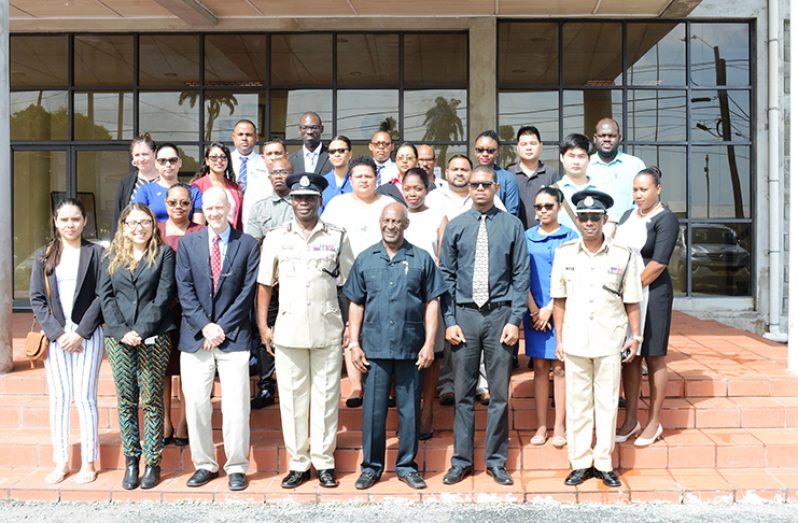A MORAL compass would prevent persons from being caught in the web of corruption and persons on the frontline are usually approached with corrupt transactions which defeat the purpose of law enforcement.
This perspective was shared on Wednesday by Minister within the Ministry of Social Protection with responsibility for labour, Keith Scott, during his address to participants of a two-day Trafficking in Persons (TIP) Training Course for Interpreters at the Police Training Centre, Camp Street, Georgetown.
“Your job is to do your duty, I encourage participants to take full advantage of what is being imparted and communicated to you, and its government’s philosophy to eradicate this evil from society,” Minister Scott said.
The junior minister explained that even though there are laws to tackle the scourge of TIP, it is necessary to go further with intensified promotion and awareness. He added that this recommitted effort by the ministry is significant in combatting modern day slavery.
“TIP is one of the worst human rights violations,” he said. Participants will be trained to recognise and differentiate TIP in all spheres, techniques and aspects of life. “We feel we have the tools and the capacity and skills to effectively combat TIP in this country and your role as interpreters over the number of years will help, since many persons, when being questioned, would say that they don’t understand English; now that escape hatch will no longer be there, it will be closed forever,” Minister Scott said.
He said that the training programme is designed especially to bring interpreters closer to TIP victims. “It is therefore absolutely necessary that all stakeholders clearly understand each other’s role so that the objective of each other’s message can be clearly understood and properly fulfilled,” Minister Scott said.
Commissioner of Police Leslie James said TIP is one of the scourges of the earth and the Guyana Police Force is clear on its mandate and role in the fight against it.
The Top Cop said trading in humans is fueled by criminal enterprises and it is a very serious matter, as Guyana is going to advance its efforts to fight the crime, especially since the country is a signatory to the UN convention.
James expressed his optimism that the objective of the training and implementation will be achieved.
Trafficking in Persons (TIP) Coordinator (ag) Oliver Profitt, in giving an overview, said almost half of all alleged victims in police reports indicate that they were foreigners who do not speak English.
He explained that support from translators is essential when dealing with suspects and victims of TIP in order for a successful prosecution.
“We know that victims of TIP are usually under duress and the longer things take to come to a resolution, the more difficult it is to have the participation of the victim throughout the entire process; so we want to take steps to make that process more comfortable for them,” Profitt said.
Adding that having translators trained in TIP and its occurrence in Guyana will assist the law enforcement bodies tremendously. The TIP coordinator said the three objectives of the training course is to equip interpreters with information regarding the nature of crime in TIP and the function of the local task force, agencies and non-governmental organizations.
Secondly, he said the course will also equip interpreters with the working knowledge to effectively communicate with victims and with TIP officers during interviews and in other cases where interpreters are needed.
Finally, Profitt said participants will also build a working relationship since they are bilingual individuals who can be of great assistance when called upon; this will target foreign missions and local services.
International Organisation for Migration (IOM) Chief of Missions in Guyana, Robert Natiello, said the problem of human trafficking is slavery of the 21st century and cases of labour, sexual exploitation, domestic servitude, among other forms of trafficking number in the millions globally.
These cases, he said, affect all human beings and there is no one group or gender that is not affected by TIP. The IOM Chief said that his agency recorded 90,000 victims of trafficking for the past decade.
“We don’t believe we can do this alone, we need to act in coordination with partners from the government, partners from civil society, partners from the media, NGO’s and civil society and all important actors,” the IOM Chief said.



.jpg)









